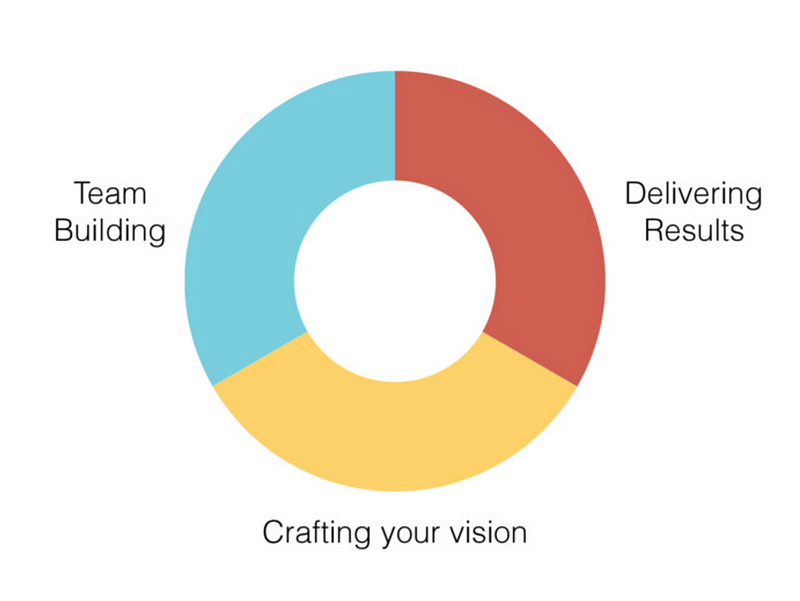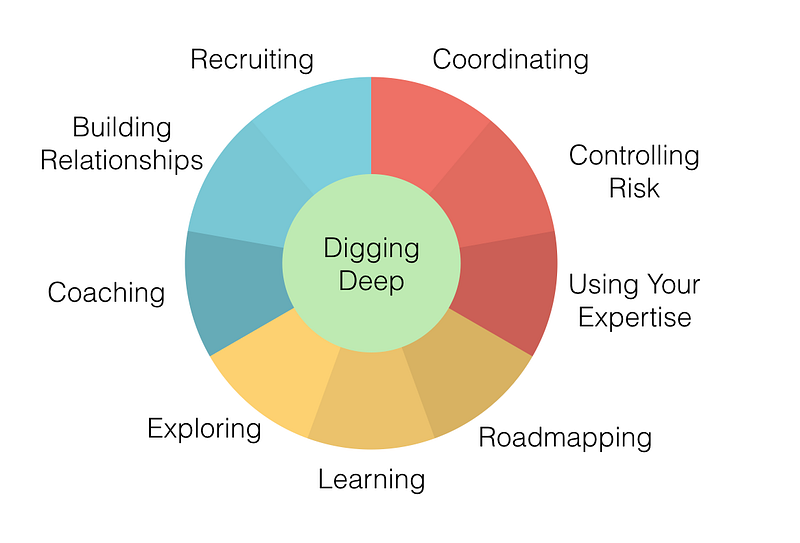The missing piece of a manager’s responsibilities
The missing piece of a manager’s responsibilities

In September 2016 I gave a presentation on managerial focus at the Calibrate Conference. In that talk I outlined the responsibilities of a manager and shared the tools I have been developing to decide which responsibilities to focus at any given time. But now, after giving that talk, I realize that there is a major responsibility that I left out. It’s the core of what we do as managers, but it was so easy for me to overlook because the focus is internal. I call it, “digging deep”: owning your successes and knowing that you can overcome whatever challenges come your way.
Review of Management Responsibilities
In my talk, I focused on the three main responsibilities of a manager: Team Building, Delivering Results, and Crafting Your Vision

Team building consists of coaching, building relationships and recruiting. Delivering results consists of controlling risk, coordinating work, and using your technical expertise. And finally, crafting your vision consists of roadmapping, learning, and exploring. In the talk I also provide techniques to gather data on each of these responsibilities and provide a system for deciding which area to focus on and in what order. If you’re interested in learning more about that, you can watch the 20 minute presentation here.
Despite these three areas being vital, I still left out a major component that I’m writing about today.
The Missing Piece
Each of these areas in and of themselves is very challenging. They require immense amounts of stamina and focus — and can consume all of your time. Tending to them can take a toll on your energy and trying to do too many of them at once can stretch even the most organized person beyond their limits.
This is where the missing piece comes in. I’ve had a hard time trying to put a name on this responsibility, but I’ve decided to call it, “digging deep.” To me, digging deep is the missing link when it comes to being a successful leader. To be digging deep means recognizing your talent, being kind to yourself, and knowing you are resilient.

I came to this realization after having a candid conversation with our Vice President of Engineering at Slack. I asked him what I could do to grow in my career. He said, “Work on your ‘executive presence.’” I wasn’t quite sure what he meant, so I reached out to an executive coach for guidance.
When I recounted this advice to her she said, “Ah yes,” in a knowing way. I was excited that she was able to translate what it meant, so I pressed for more details. She went on, “See, you strike me as tightly-wound, someone who has to have things just right all the time.”
How was I supposed to respond? The only thing that came to mind was “Hell yes I am! Hell yes I do!” I have a tremendous responsibility in my role as an engineering leader. I’ve had it since I decided to follow a natural inclination to become an engineer. I take failure really hard — not only because I want to do a good job, but because, despite my successes, I am not sure these opportunities will come again. And truthfully, because I am not sure people will back me if things go wrong.
My experience in tech is that it isn’t that it is filled with mentors who support you win or lose. More often, I’ve found cultures that expect a full smile on your face while you are pushed beyond your limits, and you better hope to god you don’t make a mistake because: “Success has many fathers, but failure is an orphan”.
The coach further explained “Executive presence is knowing that even if you make a mistake, everything will be okay.”
Recognize your Talent
When I thought about what she said, it felt like a horrible Catch 22. If you try too hard, you look like someone who is lacking confidence. If you don’t try hard, you’ll never get ahead. Could it be that trying too hard has been damaging my chances of higher success?
This paradox reminded me of a character from the TV show Brooklyn 911. Amy Santiago is extremely talented, but annoying, because she is constantly seeking validation and approval. She is overly competitive and appears to be both aware but also insecure about how good she is at her job. This isn’t a good look for her; and the show really highlights that it is an even worse look for an otherwise successful Latin-American woman.
Was I this person?

The lesson here is that people who have yet to internalize their success are undermining themselves. To be regarded as a leader you have to find your center and exude confidence.
Silence the Inner Critic
Digging deep also means taking care of yourself. We have all probably heard of self-care and equated it with external action: eating healthy food, spa days and meditation classes, but there is more to self care than that. It goes deep, all the way to the internal dialog you allow yourself. Many people in leadership are their own worst critic; sometimes that can drive us to perfection. But often, in the course of that seeking perfection, it drive us to be too hard on ourselves.
Since negative self-talk is too hard to control, just don’t do it. How well you treat yourself, even internally, is going to be the core of how well you will be able to perform each of your managerial responsibilities.
Ignore the Outer Critic
Another benefit of digging deep is that when you are comfortable with yourself, you can properly calibrate the concerns of others. And this is vital as a manager, when you are responsible for everything from mentorship to product launches.
For example, as a leader it’s easy to feel like people are constantly judging your every move. In reality, there are times when it’s real. There are people who think you can’t do the job or who think they can do it better. These aren’t inner critics, these are outer critics. Listening to, or concerning yourself with these people will throw you off your center. You can’t dig deep if you let these critics make you too afraid to fail.
Be Resilient
Digging deep means being resilient: knowing that you can fail and still grow. Knowing that if you fail you haven’t lost anything, you’ve gained knowledge, you’ve gained experience. And it’s that experience that creates great leaders — not only their successes, but also their failures.
If you want to build teams, deliver results, and craft a vision, you need to believe in your skills to solve problems and overcome challenges. It is those skills that got you to where you are now.
Know that your skills are there, and that you can call on them when the time comes.
Most leaders I know haven’t taken stock of what they are really great at. Perhaps because it comes naturally to them, they assume it’s natural to everyone. But chances are, they are a leader because of something special about them. Maybe it’s they way they connect with people, maybe it’s the way they see patterns in problems and can reapply great solutions. Chances are, you have something special too. Something you should recognize as being uniquely in your toolbox.
Summary
Of all the lessons I’ve learned over the years, this was by far the hardest. Perhaps because I was still doing everything right, I just wasn’t “making it look easy”. And there is something to that casual confidence that instills trust from others.
Something about an inner confidence that shows on the outside.
We won’t always be in environments that have our backs when we make mistakes, but we can’t let that cause us to lose our self confidence. Or prevent us from taking risks. When we have internalized our successes, we know we have the skills to take on bigger challenges. And when we are kind to ourselves we can drown out the naysayers, and bounce back from failure. This is the final responsibility of a manager: digging deep — recognizing your talent, being kind to yourself, and knowing you are resilient.
